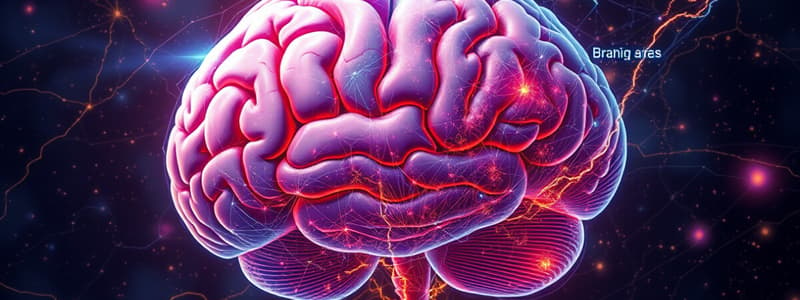Podcast
Questions and Answers
What condition can result from a deficiency of dopamine in the nigrostriatal tract?
What condition can result from a deficiency of dopamine in the nigrostriatal tract?
- Obsessions
- Parkinsonism (correct)
- Anxiety
- Suicide
What is a possible consequence of excess dopamine in the mesolimbic tract?
What is a possible consequence of excess dopamine in the mesolimbic tract?
- Psychosis (correct)
- Depression
- Cognitive deficits
- Diminished alertness
How does serotonin deficiency affect behavior?
How does serotonin deficiency affect behavior?
- Leads to aggression (correct)
- Enhances memory
- Causes elation
- Results in obsession
What role does GABA play in the brain?
What role does GABA play in the brain?
What can result from increased glutamate activity in the brain?
What can result from increased glutamate activity in the brain?
Increased activity of norepinephrine is linked to which of the following?
Increased activity of norepinephrine is linked to which of the following?
A decrease of dopamine in the mesocortical tract may lead to which issue?
A decrease of dopamine in the mesocortical tract may lead to which issue?
What mental health issue can result from serotonin excess?
What mental health issue can result from serotonin excess?
Which hemisphere of the brain is primarily responsible for language functions?
Which hemisphere of the brain is primarily responsible for language functions?
Which area of the brain is responsible for understanding spoken language?
Which area of the brain is responsible for understanding spoken language?
What function is associated with the frontal lobe?
What function is associated with the frontal lobe?
Which neurotransmitter is linked to memory functions and is affected in Alzheimer's disease?
Which neurotransmitter is linked to memory functions and is affected in Alzheimer's disease?
What is the primary function of the cerebellum?
What is the primary function of the cerebellum?
What role do cholinergic neurons have in behavior?
What role do cholinergic neurons have in behavior?
Which area of the brain is primarily involved in emotional responses and memory?
Which area of the brain is primarily involved in emotional responses and memory?
What function does the hypothalamus regulate?
What function does the hypothalamus regulate?
Flashcards are hidden until you start studying
Study Notes
Brain Organization and Structure
- The human brain has two hemispheres: left and right, with most cerebral cortex functions represented in both.
- Language function is primarily unilateral, usually located in the left hemisphere, divided into comprehension and speech areas.
- Wernicke’s area interprets spoken and written language, while Broca’s area coordinates the muscular activities for speech.
Brain Regions and Functions
- Frontal Lobe: Involved in decision-making, reasoning, planning, behavioral inhibition, and personality.
- Parietal Lobe: Processes sensations and perceptions related to touch.
- Occipital Lobe: Responsible for visual information sensation and perception.
- Temporal Lobe: Handles auditory information and language comprehension.
- Limbic System: Key for emotions, learning, memory, and motivation.
- Hypothalamus: Regulates homeostasis including body temperature, sleep, and metabolism.
- Midbrain: Important for neurotransmitter production.
- Brainstem: Controls vital functions such as breathing, heart rate regulation, and consciousness.
- Cerebellum: Responsible for motor coordination, balance, and motor learning.
Neurochemistry of Behavior
-
Neuronal signals are transmitted by neurotransmitters, crucial for various behaviors.
-
Acetylcholine:
- Involves cholinergic neurons influencing various brain areas.
- Disruption can lead to amnesia; linked to Alzheimer's disease.
- Excess associated with depression and aggression.
-
Dopamine:
- Major for motor functions and various behaviors.
- Pathways: nigrostriatal (movement), mesolimbic (emotion), and mesocortical (cognition).
- Dysfunctions cause parkinsonism (deficiency) or psychosis (excess).
-
Serotonin:
- Broadly impacts the cortex and limbic system.
- Linked to mood disorders: deficiency relates to depression and aggression; excess to anxiety and OCD symptoms.
-
Norepinephrine:
- Projects from the brain stem to many brain areas.
- Deficits associated with depression and poor concentration; excess linked to anxiety and aggression.
-
Gamma-Amino Butyric Acid (GABA):
- Main inhibitory neurotransmitter; increases can inhibit aggressive behavior.
-
Glutamate:
- Primary excitatory neurotransmitter involved in learning and memory.
- Excess activity may lead to excitotoxicity, causing neuron death, relevant in diseases like Alzheimer’s.
Studying That Suits You
Use AI to generate personalized quizzes and flashcards to suit your learning preferences.




